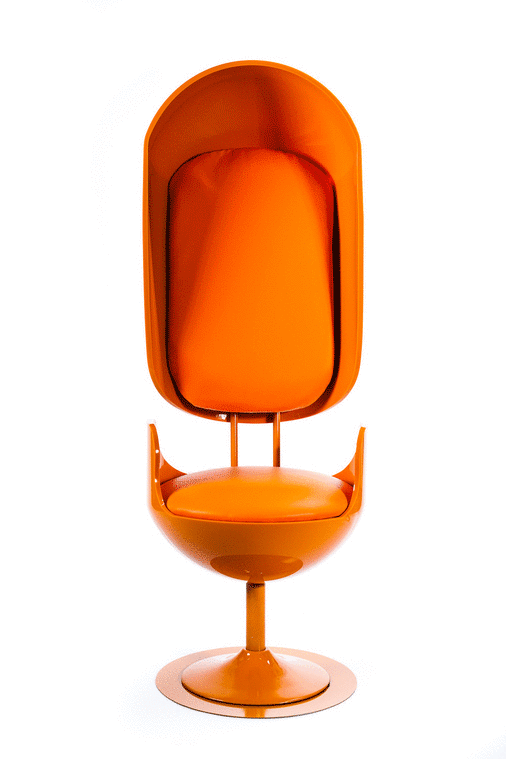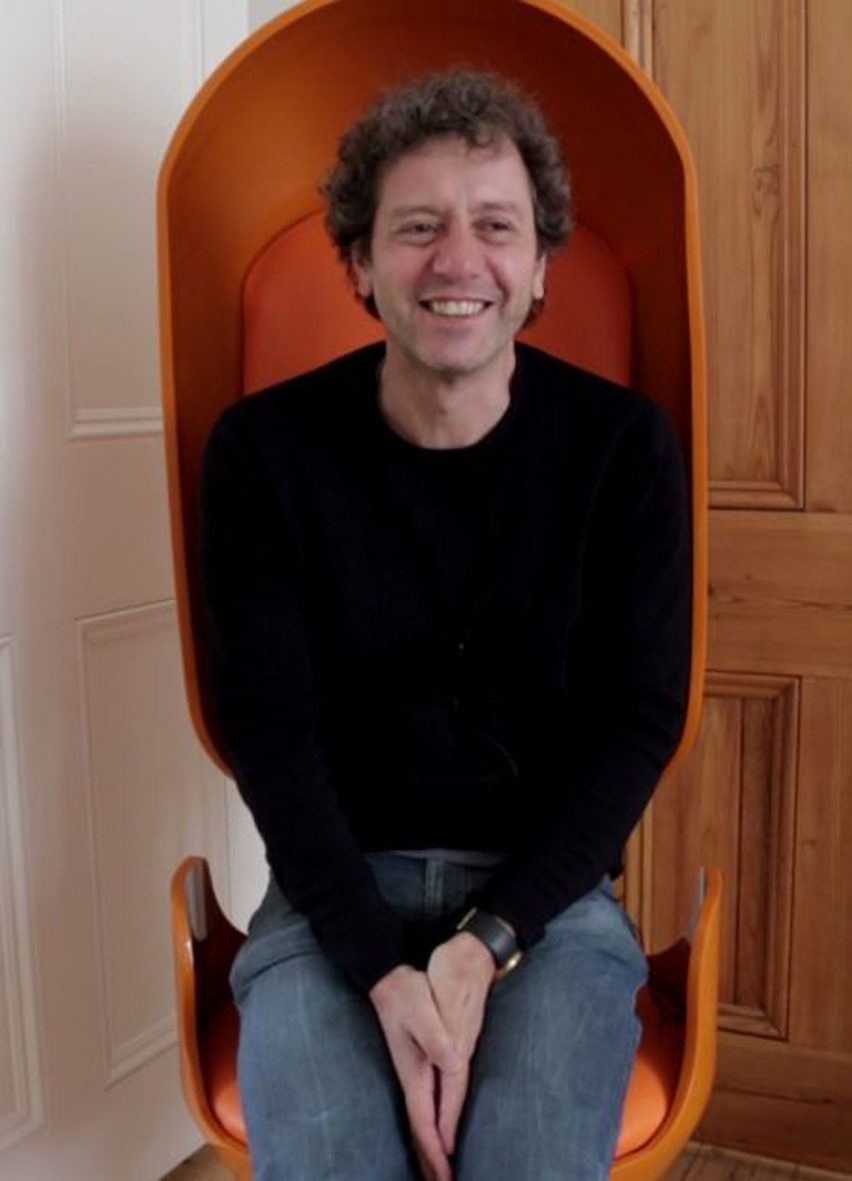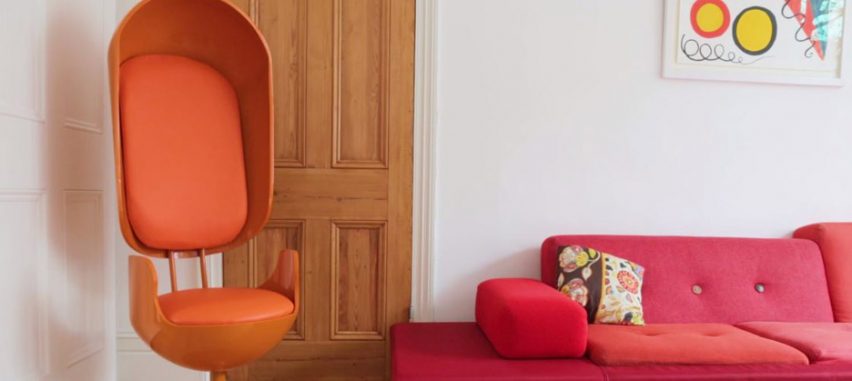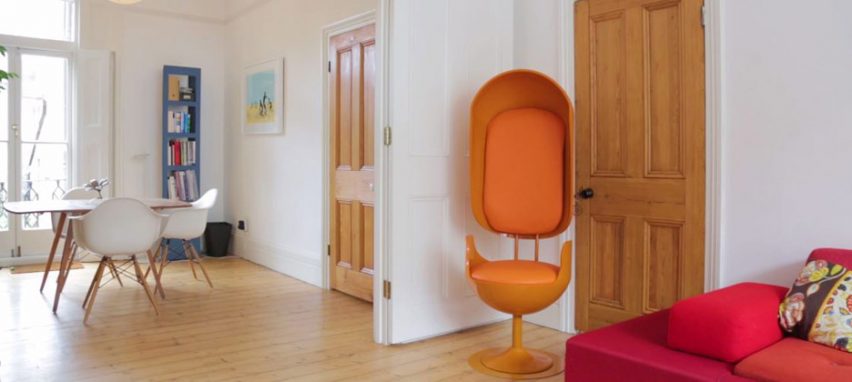Merel Bekking reveals "scientifically perfect" orange swivel chair for Dezeen's Marcus Fairs
Dutch designer Merel Bekking has presented Dezeen founder Marcus Fairs with a shiny plastic rotating chair after scanning his brain to establish his subconscious style preferences.
However Fairs, who had to live with the orange acrylic seat in his London home for four months, was unimpressed, saying he "took a violent dislike to it".
"We had it in our lounge, and it just became a useless object in the corner," he said. "Not even the cat would sit on it. We were quite relieved when she took it away."

Bekking worked with neuroscientist Steven Scholte and the Spinoza Centre for Neuroimaging in Amsterdam to establish Fairs' subconscious preferences.
They did this by analysing his brain responses using an MRI (magnetic resonance imaging) scanner, which uses magnetic fields and radio waves to generate detailed images of internal organs.
Bekking used the data to create a personalised item of furniture that she hoped would be "scientifically perfect".
The scans revealed heightened brain activity when Fairs was shown orange, plastic, closed rounded shapes and chairs – so Bekking developed a design that combined these characteristics.
The outcome at first surprised Fairs. "She turned up at our house with this shiny orange chair," he said. "I'd never considered shiny orange things to be anything that I would go for, but then I was intrigued by it because it had a sort of retro, 60s space-age feel to it."

However he soon developed a strong dislike of the object. "In hindsight, I don't believe that it reflects any of my psychological preferences for furniture," he said. "I can't see any connection between that object and my taste."
Bekking believes the conflict between Fairs' subconscious and conscious preferences might be the result of social pressures, which would explain why he felt a degree of embarrassment when showing the chair to visitors.
"Fairs' sudden change of mind and his feelings of shame for the chair implies a more socially conscious side to the project," said the designer.
"Our initial reaction to objects around us might be closer to our subconscious preferences, but we put a more conscious, socially aware, filter over it. It might not be conscious decision to do so, but it does affect the long-term relationships that we have with objects."

The project, called Your Brain Manufacturing, was an extension of Bekking's Brain Manufacturing project, which explored whether designers can use brain analysis to determine what people really like, rather than what their social conditioning leads them to believe they like.
"The project started with me wanting to create perfection," Bekking said. "Of course, this is really hard because it is subject to taste and aesthetics and all these hard-to-grasp feelings. So I thought, why not make something that is scientifically proven to be perfect?"
Bekking's initial research gathered and culminated data from 20 women and 20 men. The results revealed a preference for red, plastic, organically shaped objects. Bekking made a series of such objects and exhibited them in Milan in 2014.
For the latest stage of her research, Bekking chose to profile just one person, allowing her to create an individually tailored object.
"For Your Brain Manufacturing I wanted to scan someone who is trained to make decisions about what he or she likes," Bekking told Dezeen. "Therefore, I wanted to work with someone that works with taste and aesthetics on a daily basis, actively has to think about what they think about an object and know how to describe their opinions."
Bekking, 30, graduated from Utrecht School of the Arts with a degree in product design in 2011. She began her own studio in 2012 and is currently based in north Wales.
To determine Fairs' furniture preferences, Bekking placed him in the MRI scanner and showed him 240 different images of shapes, colours and materials. The scanner recorded changes in blood flow to his brain as he responded to the images.
These images were mixed up with visuals Fairs had given her in advance, and which represented things he liked and disliked. Bekking used these to create an "emotion mapper" against which to score and compare the rest of his responses.
"The emotion mapper was created by calculating the difference in average activation patterns for positive and negative designs," Bekking explained. "To measure the brain valuation of the different design components, each component was compared to the emotion mapper in terms of activation."

Bekking's experiments with brain scanning are similar to the emerging field of neuromarketing, which aims to reveal consumers' subconscious desires.
Some of the world's biggest companies are experimenting with this application of neuroscience, using devices like MRI scanners and biometric sensors to test the responses of consumers to their products.
Among companies experimenting with neuromarketing is Austrian lighting brand Zumtobel, which in 2014 conducted a study into how shoppers respond to different lighting scenarios.
During the study, a survey group was presented with fashion items displayed in a simulated shop, with the interior displayed on a large curved screen that transformed through 20 different lighting schemes.
The researchers measured the subjects' unconscious physical reactions in an effort to identify whether the different lighting scenarios prompted positive or negative feelings toward the products.